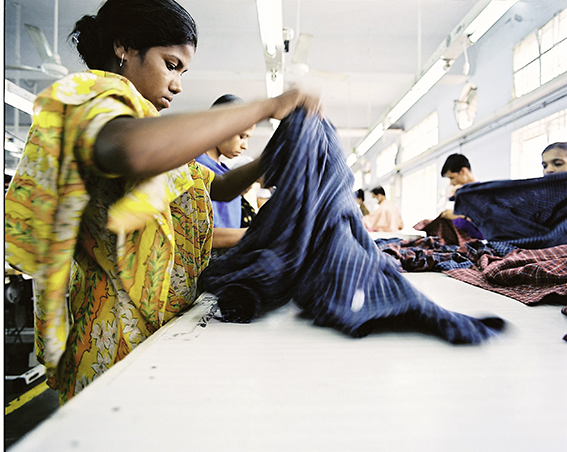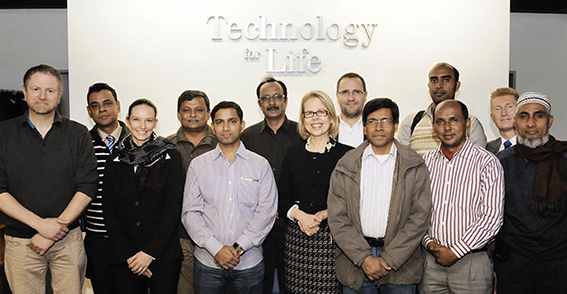New Partnerships for Disaster Risk Management
“Economic losses from disasters are out of control and can only be reduced in partnership with the private sector”. The UN Secretary-General Ban Ki-moon highlights here that in a world of population growth, rapid urbanisation and climate change, there is a need for the private and public sector to build strong partnerships for disaster risk management. Especially the private sector is an exposed actor as well as a potential pioneer for innovative disaster risk management solutions.
The region Asia-Pacific is most prone to natural hazards that have the potential to destroy private and public property as well as essential infrastructure, causing severe problems for governments, businesses and communities. While disaster fatalities have been reduced successfully during the recent decade, economic losses are rising tremendously despite increasing awareness of disaster risks and investments in risk reduction measures. Businesses face more complex, unpredictable events and sudden changes with a high potential for future losses. The business world has witnessed the recurrent flooding in Thailand that caused a 9 per cent drop in the Thai GDP, the earthquake, tsunami and nuclear disaster in Japan and deadly factory fires and building collapse in Bangladesh.
Still, the majority of investments being made today do not consider disaster risks, thereby in the worst case scenario contributing to the generation of new risks. Global and interconnected value and supply chains have also contributed to extended vulnerabilities and under-estimated risks, where local disasters can have global impacts. Disaster risks have become embedded in the contemporary business landscape.
The latest UN's Global Assessment Report on Disaster Risk Reduction (GAR13) provides evidence regarding the growing impact of disasters on business through rising direct losses, supply chain interruptions and wider effects on longer-term competitiveness, sustainability, profitability and reputation. Businesses that have been hit by disasters unpreparedly may lose their customers and market share to their competitors.
Small and medium enterprises (SMEs) are particularly vulnerable and widely exposed to natural hazards. SMEs play an important role in the economy and account for 80 per cent of the investments in Asia. They provide for onethird of employment in low-income countries and constitute 52 per cent of GDP in high-income countries. A single disaster can affect the capital of small enterprises and also large companies relying on local suppliers.
SMEs – Pioneers in innovative solutions
The business case for stronger disaster risk management is manifold: Disaster risk management reduces uncertainty, strengthens confidence, cuts costs and creates values for businesses. There is a growing recognition of the importance and value of disaster risk management that needs a more systematic approach to integrate measures in business processes to ensure long-term competitiveness and sustainability. Most businesses address disaster risks through the paradigm of business continuity planning.
Further action is required to integrate risk information into investment decisions, to identify risks in supply chains and to build strong partnerships for di saster risk management to achieve tangible results. Disaster risk management is also a business opportunity. The development of innovative risk management and transfer products, of more resilient infrastructure and emergency relief tools expand existing and opens up new markets. SMEs as pioneers in innovative solutions have the potential to become one of the drivers for change in both risk sensitive investments and practices.
At the same time, business depends on the capacity of the public sector to provide resilient infrastructure and risk management systems, which underpin competitive and sustainable economies. Budgetary impact of responding to and recovering from natural disasters could potentially be significantly reduced through carefully considered and directed investments in integrated and innovative disaster risk management solutions. Governments, civil society and the private sector need to strengthen their partnerships. Public-private partnerships for fire prevention and safety in the garment industry of Bangladesh illustrate how different stakeholders can work together to achieve common objectives.
Fire Prevention and Safety in the Garment Industry
It was during a joint seminar on fire prevention and safety in the garment industry on 8th October 2013, when an emergency call came in over the radio. The Director-General of the Bangladesh Fire Service and Civil Defence, Brigadier Ali Ahmed Khan, and his team were sitting together with delegation members from the professional fire brigade from the City of Bonn and advisors from Deutsche Gesellschaft für Internationale Zusammenarbeit (GIZ) GmbH.
All of them witnessed the desperate radio messages from the textile factory Aswad Composite Mills Ltd. in Gazipur district in the outskirts of Dhaka that had caught fire.
The professional fire brigade of Dhaka tried to force its way through the evening rush hour, but arrived only about an hour later on the site. Although many workers had left the building before the fire broke out, ten people lost their lives in the blaze and more than 50 people were injured. The garment industry in Bangladesh has come under international criticism following a number of serious accidents and difficult labour and fire safety conditions in factories.
In November 2012, more than 110 people were killed in a fire at a textile factory in Ashulia. A year ago on April 24th 2013 more than 1,100 people died and 1,700 were injured in the collapse of a tower factory in Savar. Both disasters could have been avoided if the factory owners had complied with the safety regulations. Dhaka is lacking a nationwide operating network of fire stations and plant fire brigades. Poor infrastructure hinders rapid response in case of emergencies. The access roads to the factories are often narrow and unpaved. The factories are poorly equipped with hydrants and fire extinguishers and the water hoses are mostly in worn out condition.
Fire alarms are faulty and the first responders in the factories are poorly trained. Bringing the garment industry and the Bangladesh Fire Service together was seen as a way out of this situation. With financial support from the German Federal Ministry of Economic Cooperation and Development (BMZ), GIZ has initiated a close exchange between public and private Bangladesh stakeholders with German fire brigades and specialized German companies to jointly tackle more effectively the challenge of fire prevention and safety in the Bangladesh garment industry.
A Fire Safety Mission to Germany was organised to learn more about the way fire prevention and safety measures are implemented in Germany and what innovative solutions the private sector can offer for an integrated fire prevention and safety concept even for difficult conditions like in Bangladesh. Site visits to companies like Rosenbauer Deutschland AG, Drägerwerk AG & Co., TRIGEMA, and Lentner GmbH informed the participants about private sector approaches to fire prevention and offered an inside in production facilities as well as the wide range of high quality products.
For example Dräger's respiratory protection equipment, their spare parts, maintenance and distribution system in Bangladesh has been of particular interest for the participants. An exchange with professional fire brigades in Bonn and Munich and with the voluntary fire brigade in Feldafing highlighted the role of the public sector in fire prevention. The training of fire inspectors as well as the development and implementation of decentralized fire stations, located nearby the garment production centres are now deemed a key priority in Bangladesh to ensure an optimal protection of industrial enterprises while also benefiting the whole community.
Such decentralized fire stations will serve as an awareness and resource centre for fire prevention and safety measures, rescue personnel of the factories affected by fire or building collapse, delete incipient fires and prevent the spill over of flames on adjacent buildings, and be the first responder to incidents and disasters in the defined target area. The decentralized fire stations will work under the command of the Bangladesh Fire Service and Civil Defence Directorate, but will include fire safety focal points of the factories and trained volunteers from the surrounding community.
A suitable and economically viable concept will be developed and implemented under a public-private partnership program, including the Bangladesh Fire Service and Civil Defence Directorate, the local garment industry and international wholesalers. The PPP programme will be facilitated by the Global Initiative on Disaster Risk Management (GIDRM) which is being coordinated by GIZ. The aim of the initiative is to facilitate mutual learning of regional and German experts from the public and the private sector, academia and civil society, and to pilot innovative disaster risk management solutions across regions.
The initiative intends to cluster German competencies in regard to disaster risk management and to support specialized services and technologies ‘Made in and with Germany’ more effectively. In Asia, the initiative currently comprises seven countries including India, China, Indonesia, Thailand, the Philippines, Myanmar and Bangladesh. In Bangladesh, GIDRM closely cooperates with another BMZfunded bilateral programme that promotes social and environmental standards in the textile industry.
A suitable and economically viable concept will be developed and implemented under a public-private partnership program, including the Bangladesh Fire Service and Civil Defence Directorate, the local garment industry and international wholesalers.
The PPP programme will be facilitated by the Global Initiative on Disaster Risk Management (GIDRM) which is being coordinated by GIZ. The aim of the initiative is to facilitate mutual learning of regional and German experts from the public and the private sector, academia and civil society, and to pilot innovative disaster risk management solutions across regions.
The initiative intends to cluster German competencies in regard to disaster risk management and to support specialized services and technologies ‘Made in and with Germany’ more effectively. In Asia, the initiative currently comprises seven countries including India, China, Indonesia, Thailand, the Philippines, Myanmar and Bangladesh. In Bangladesh, GIDRM closely cooperates with another BMZfunded bilateral programme that promotes social and environmental standards in the textile industry.



